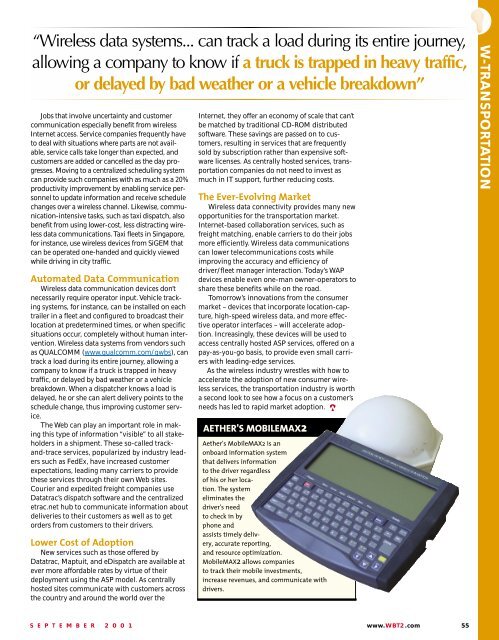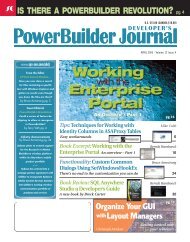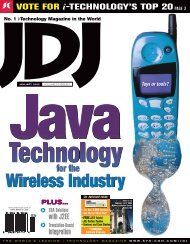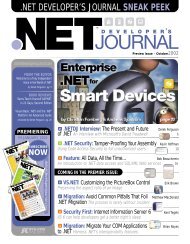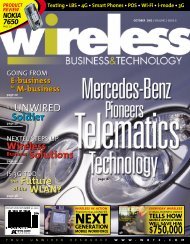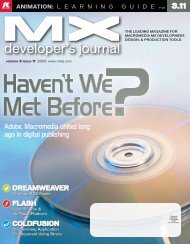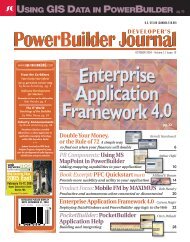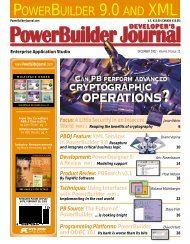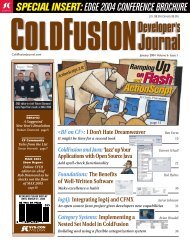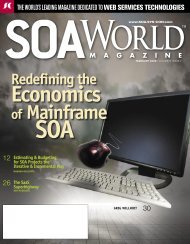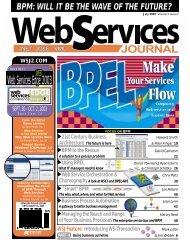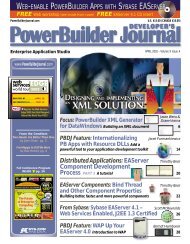wireless primer - sys-con.com's archive of magazines - SYS-CON ...
wireless primer - sys-con.com's archive of magazines - SYS-CON ...
wireless primer - sys-con.com's archive of magazines - SYS-CON ...
Create successful ePaper yourself
Turn your PDF publications into a flip-book with our unique Google optimized e-Paper software.
“Wireless data <strong>sys</strong>tems... can track a load during its entire journey,<br />
allowing a company to know if a truck is trapped in heavy traffic,<br />
or delayed by bad weather or a vehicle breakdown”<br />
Jobs that involve uncertainty and customer<br />
communication especially benefit from <strong>wireless</strong><br />
Internet access. Service companies frequently have<br />
to deal with situations where parts are not available,<br />
service calls take longer than expected, and<br />
customers are added or cancelled as the day progresses.<br />
Moving to a centralized scheduling <strong>sys</strong>tem<br />
can provide such companies with as much as a 20%<br />
productivity improvement by enabling service personnel<br />
to update information and receive schedule<br />
changes over a <strong>wireless</strong> channel. Likewise, communication-intensive<br />
tasks, such as taxi dispatch, also<br />
benefit from using lower-cost, less distracting <strong>wireless</strong><br />
data communications. Taxi fleets in Singapore,<br />
for instance, use <strong>wireless</strong> devices from SiGEM that<br />
can be operated one-handed and quickly viewed<br />
while driving in city traffic.<br />
Automated Data Communication<br />
Wireless data communication devices don’t<br />
necessarily require operator input. Vehicle tracking<br />
<strong>sys</strong>tems, for instance, can be installed on each<br />
trailer in a fleet and <strong>con</strong>figured to broadcast their<br />
location at predetermined times, or when specific<br />
situations occur, completely without human intervention.<br />
Wireless data <strong>sys</strong>tems from vendors such<br />
as QUALCOMM (www.qualcomm.com/qwbs), can<br />
track a load during its entire journey, allowing a<br />
company to know if a truck is trapped in heavy<br />
traffic, or delayed by bad weather or a vehicle<br />
breakdown. When a dispatcher knows a load is<br />
delayed, he or she can alert delivery points to the<br />
schedule change, thus improving customer service.<br />
The Web can play an important role in making<br />
this type <strong>of</strong> information “visible” to all stakeholders<br />
in a shipment. These so-called trackand-trace<br />
services, popularized by industry leaders<br />
such as FedEx, have increased customer<br />
expectations, leading many carriers to provide<br />
these services through their own Web sites.<br />
Courier and expedited freight companies use<br />
Datatrac’s dispatch s<strong>of</strong>tware and the centralized<br />
etrac.net hub to communicate information about<br />
deliveries to their customers as well as to get<br />
orders from customers to their drivers.<br />
Lower Cost <strong>of</strong> Adoption<br />
New services such as those <strong>of</strong>fered by<br />
Datatrac, Maptuit, and eDispatch are available at<br />
ever more affordable rates by virtue <strong>of</strong> their<br />
deployment using the ASP model. As centrally<br />
hosted sites communicate with customers across<br />
the country and around the world over the<br />
S E P T E M B E R 2 0 0 1<br />
Internet, they <strong>of</strong>fer an e<strong>con</strong>omy <strong>of</strong> scale that can’t<br />
be matched by traditional CD-ROM distributed<br />
s<strong>of</strong>tware. These savings are passed on to customers,<br />
resulting in services that are frequently<br />
sold by subscription rather than expensive s<strong>of</strong>tware<br />
licenses. As centrally hosted services, transportation<br />
companies do not need to invest as<br />
much in IT support, further reducing costs.<br />
The Ever-Evolving Market<br />
Wireless data <strong>con</strong>nectivity provides many new<br />
opportunities for the transportation market.<br />
Internet-based collaboration services, such as<br />
freight matching, enable carriers to do their jobs<br />
more efficiently. Wireless data communications<br />
can lower telecommunications costs while<br />
improving the accuracy and efficiency <strong>of</strong><br />
driver/fleet manager interaction. Today’s WAP<br />
devices enable even one-man owner-operators to<br />
share these benefits while on the road.<br />
Tomorrow’s innovations from the <strong>con</strong>sumer<br />
market – devices that incorporate location-capture,<br />
high-speed <strong>wireless</strong> data, and more effective<br />
operator interfaces – will accelerate adoption.<br />
Increasingly, these devices will be used to<br />
access centrally hosted ASP services, <strong>of</strong>fered on a<br />
pay-as-you-go basis, to provide even small carriers<br />
with leading-edge services.<br />
As the <strong>wireless</strong> industry wrestles with how to<br />
accelerate the adoption <strong>of</strong> new <strong>con</strong>sumer <strong>wireless</strong><br />
services, the transportation industry is worth<br />
a se<strong>con</strong>d look to see how a focus on a customer’s<br />
needs has led to rapid market adoption.<br />
AETHER'S MOBILEMAX2<br />
Aether's MobileMAX2 is an<br />
onboard information <strong>sys</strong>tem<br />
that delivers information<br />
to the driver regardless<br />
<strong>of</strong> his or her location.<br />
The <strong>sys</strong>tem<br />
eliminates the<br />
driver's need<br />
to check in by<br />
phone and<br />
assists timely delivery,<br />
accurate reporting,<br />
and resource optimization.<br />
MobileMAX2 allows companies<br />
to track their mobile investments,<br />
increase revenues, and communicate with<br />
drivers.<br />
www.WBT2.com<br />
55<br />
W-TRANSPORTATION


